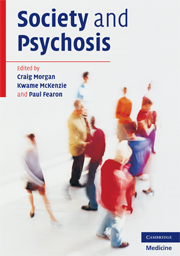Book contents
- Frontmatter
- Contents
- Contributors
- Acknowledgements
- 1 Introduction
- 2 Climate change in psychiatry: periodic fluctuations or terminal trend?
- Part I Theoretical and conceptual foundations
- Part II Social factors and the onset of psychosis
- Part III Social factors and the outcome of psychosis
- Part IV Models and conclusions
- 14 Theories of cognition, emotion and the social world: missing links in psychosis
- 15 Society and psychosis: future directions and implications
- Index
- References
15 - Society and psychosis: future directions and implications
from Part IV - Models and conclusions
Published online by Cambridge University Press: 07 December 2009
- Frontmatter
- Contents
- Contributors
- Acknowledgements
- 1 Introduction
- 2 Climate change in psychiatry: periodic fluctuations or terminal trend?
- Part I Theoretical and conceptual foundations
- Part II Social factors and the onset of psychosis
- Part III Social factors and the outcome of psychosis
- Part IV Models and conclusions
- 14 Theories of cognition, emotion and the social world: missing links in psychosis
- 15 Society and psychosis: future directions and implications
- Index
- References
Summary
Psychotic disorders may be more common than previously thought. In a recent Finnish study, one of the most rigorous and comprehensive to date, estimates of lifetime prevalence were in excess of 3% for all psychotic disorders combined, irrespective of data source used (Perala et al., 2007). This is a substantial public health problem. Schizophrenia and other psychoses are often lifelong conditions, characterised by distressing symptoms and considerable social disability and exclusion. The impact extends to family, not infrequently leading to a lifetime of care. As we have seen in Chapter 12, the negative responses of others compound suffering and feelings of isolation. The social costs are equally significant, in terms of lost productivity and costs of providing care, both formal and informal. In the UK, for example, recent estimates put the total societal costs of schizophrenia at £6.7 billion, much of these costs arising from informal care and private expenditures borne by families (Mangalore and Knapp, 2006). This is the background against which all research needs to be set. The imperative that drives attempts to understand the aetiology, course and outcome of psychosis better is the need to create more effective responses, be these at the levels of public policy, service delivery or clinical practice, to alleviate suffering and reduce burden.
For some, the question of what role social conditions and experiences have in the onset, course and outcome of psychosis remains controversial. This is particularly the case for aetiology.
- Type
- Chapter
- Information
- Society and Psychosis , pp. 238 - 251Publisher: Cambridge University PressPrint publication year: 2008
References
- 1
- Cited by

